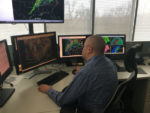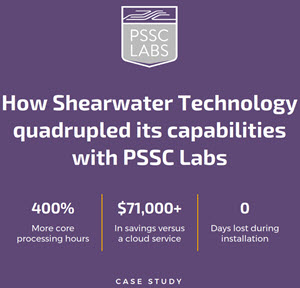April 22, 2022 — The U.S. National Science Foundation (NSF) has awarded $7.5 million over five years to the Resource Allocations Marketplace and Platform Services (RAMPS) project, a next-generation system for awarding computing time in the NSF’s network of supercomputers. Led by the Pittsburgh Supercomputing Center (PSC), a joint program of Carnegie Mellon University and […]
Journal: NCAR Supercomputer ‘Up Against Complex Physics of Programming Thousands of Weather Variables’
The “Cheyenne” supercomputer, an Intel-powered SGI system installed in 2017 at the National Center for Atmospheric Research (NCAR) in Boulder, is at the heart of a major article on climate change appearing in yesterday’s Wall Street Journal. The article, based on extensive interviews with climate scientists at NCAR and other organizations, asserts that HPC simulations […]
Hyperion Research Announces Winners of HPC Innovation Excellence Awards
Hyperion Research today announced the 17th round of recipients of the HPC Innovation Excellence Award. The award winners are: National Center for Atmospheric Research (NCAR). Better wildfire models save property and life. Refined fidelity of predictive models, using AI. Contact: Branko Kosovic, Director of the Weather Systems and Assessment Program and the Program Manager for Renewable […]
Why HPE Cray EX Is the Supercomputer of Choice at Leading Weather Centers
[SPONSORED POST] For decades, compute resources used for weather forecasting have tracked with advances in state-of-the-art supercomputing. Which is to say that the weather segment demands systems with the greatest data ingest and storage capacity combined with the most powerful processing capabilities. As the accuracy of daily weather forecasts and warnings of severe weather depend on high-performance computing combined, increasingly, with artificial intelligence, it is perhaps not surprising that weather segment IT spending has not been affected by the COVID-19 pandemic. Hyperion Research predicts that it will in fact grow by an astonishing 33 percent between 2021–20241, significantly outpacing
NCAR Official to Discuss New Supercomputer Friday at Univ. of Wyoming
September 13, 2021 — A top director with the National Center for Atmospheric Research (NCAR) is coming to the University of Wyoming to discuss the capabilities and uses of a new supercomputer that will be installed in the NCAR-Wyoming Supercomputing Center (NWSC) near Cheyenne. Thomas Hauser, director of NCAR’s Computational and Information Systems Laboratory Technology […]
HPE to Build $35M+ NCAR Supercomputer for Extreme Weather Research
Hewlett Packard Enterprise (HPE) this morning said it has won a $35+ million contract to build a supercomputer for the National Center for Atmospheric Research (NCAR), a federal geoscience R&D center for meteorology, climate change and solar activity. HPE said the CPU/GPU-powered system, funded by the National Science Foundation, is expected to deliver 3.5x the […]
Deep Learning for Predicting Severe Weather
Researchers from Rice University have introduced a data-driven framework that formulates extreme weather prediction as a pattern recognition problem, employing state-of-the-art deep learning techniques. “In this paper, we show that with deep learning you can do analog forecasting with very complicated weather data — there’s a lot of promise in this approach.”
Interactive Supercomputing with Jupyter and DASK
Anderson Banihirwe from NCAR gave this talk at SciPy 2019. “This talk demonstrates how to use Dask and Jupyter on large high-performance computing (HPC) systems to scale and accelerate large interactive data analysis tasks — effectively turning HPC systems into interactive big-data platforms. We will introduce dask-jobqueue which allows users to seamlessly deploy and scale dask on HPC clusters that use a variety of job queuing systems such as PBS, Slurm, SGE, and LSF. We will also introduce dask-mpi, a Python package that makes deploying Dask easy from within a distributed MPI environment.”
Epic HPC Road Trip Continues to NCAR
In this special guest feature, Dan Olds from OrionX continues his Epic HPC Road Trip series with a stop at NCAR in Boulder. “Their ability to increase model precision/resolution and to increase throughput at the same time is becoming more difficult over time due to core speed slowing down as more cores are added. In other words, new chips aren’t providing the same increase in performance as we’ve become accustomed to over the years.”
NOAA and NCAR team up for Weather and Climate Modeling
The United States is making exciting changes to how computer models will be developed in the future to support the nation’s weather and climate forecast system. NOAA and the National Center for Atmospheric Research (NCAR) have joined forces to help the nation’s weather and climate modeling scientists achieve mutual benefits through more strategic collaboration, shared resources and information.









